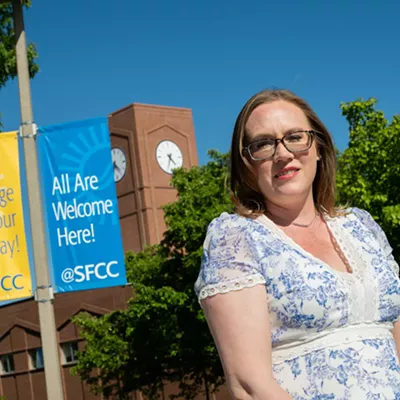When six citizen-backed initiatives made it to the Washington Legislature last year, only three of them, including Initiative 2081, otherwise known as the "Parents' Bill of Rights," received public hearings before lawmakers, who passed them a week later. The others didn't see any action in the Legislature and were placed on statewide ballots for voters to decide.
As the Let's Go Washington-backed parental rights initiative came to the Legislature, state Rep. Monica Stonier, D-Vancouver, says her first focus was to ensure that it wouldn't impact existing health care policy.
"There were lots of questions about [I-2081] because people, the far right in particular, were talking about it in terms of restricting gender-affirming care or abortion access, and I was like, 'This has nothing to do with that,'" Stonier recalls. "We did ask some clarifying questions before passing the initiative, to just confirm that health care policy was not affected."
When the House Democrats' attorneys found that the initiative would not impact health care, she and most of her Democratic colleagues got on board. Just a week after its first public hearing in both chambers, the initiative passed the House in an 82-15 vote and the Senate with unanimous support.
Last year, the Inlander reported that the decision to pass this parental rights law, rather than let it go to statewide ballots, would give legislators more control over it in the future. Now a year later, House Bill 1296, which has already passed the House along party lines, would change parts of I-2081. In the Senate, the bill has passed through the Early Learning & K-12 Education and Ways and Means committees, and is awaiting a floor vote.
"I don't regret voting for [I-2081], because I don't disagree that parents have a right to be the first and most involved teacher in their child's lives," Stonier says. "But the rhetoric around that initiative has been a bit more intrusive on students' rights to be who they are in a school environment that's welcoming to them."
After the initiative's passage into law, Stonier, who serves on the House Education and Health Care & Wellness committees, says she became increasingly aware that it allowed some school districts to be less accepting of LGBTQ+ students. The fact that a school employee is required to tell a student's parents if they're exploring their gender identity or using different pronouns can be dangerous to those students, she says.
"It turned out there's been a number of policies and procedures in school districts that are clearly unwelcoming to students who happen to be LGBTQ, so I just started thinking about some type of response to the parents' rights initiative, because there was clarification that clearly needed to happen," says Stonier, who is also an educator with Evergreen Public Schools. "I've experienced and witnessed a number of the ways that kids come to us in school, a number of the ways that they are welcomed or not, so I think that experience has really helped me figure out exactly how I wanted to take an approach to this bill."
Stonier says HB 1296 has four aims, including: confirming that the Office of Superintendent of Public Instruction is charged with providing guidance and ensuring compliance at schools; enshrining a statement of student rights; reaffirming parents' rights; and providing protections against retaliation for school employees like teachers and counselors.
The inclusion of students' rights in the bill was important to Stonier, who has been a teacher for about 25 years.
"Schools are for kids, you know, my No. 1 customer is my student, and I have a really hard time talking about issues in the school setting without first talking about what a student needs," she says. "Students have a right to an inclusive curriculum. They have a right to be welcomed in a school building. They have a right to fully participate in their education. They have a right to get support when they need it, and they have a right to be affirmed for whoever they are as they come to us."
'BETRAYAL'
While Stonier believes her bill would make schools a more welcoming place for all students, Rep. Mike Volz, R-Spokane, says HB 1296 is a betrayal of Washington's parents.
When I-2081 was passed last year, he says it added a new layer of transparency for parents who worried that schools were bypassing their authority when it came to educating their kids. This new legislation would update some of those rights.
For example, the initiative guaranteed parents the right to receive a copy of their child's education records within 10 days, but HB 1296 would change that to a maximum of 45 days. The bill would also remove language about notifying parents when their child receives any medical care.
The initiative states that parents must receive prior notification when any nonemergency medical services and mental health services are offered to their child, when medical services and medications are provided to their child that could result in any financial impact, and when the medical treatment a student receives results in follow-up treatment outside school hours.
Stonier's bill would remove those requirements and instead refers to existing state law (RCW 70.02) for health care access and disclosure — which also says confidential information relating to a minor's mental and behavioral health services can be disclosed to their parents.
"They're trying to undermine parental authority, and it's appalling," Volz says.
However, the bill also would strengthen the rights of parents who Stonier says weren't included in the initiative's language, including the parents of children who speak another language, have special needs or are undocumented.
"Those types of parents were not included in the far-right-sponsored initiative, so we added those," Stonier says.
In opposition to the bill, Republicans introduced more than 100 amendments — most were not adopted, were later withdrawn or were submitted out of order. Volz says it was an attempt to push back against the "bad bill," but he's not sure he would have voted for the bill even if the GOP's numerous amendments had been adopted.
"I can't think I would do this even if they passed our amendments," he says. ♦

























